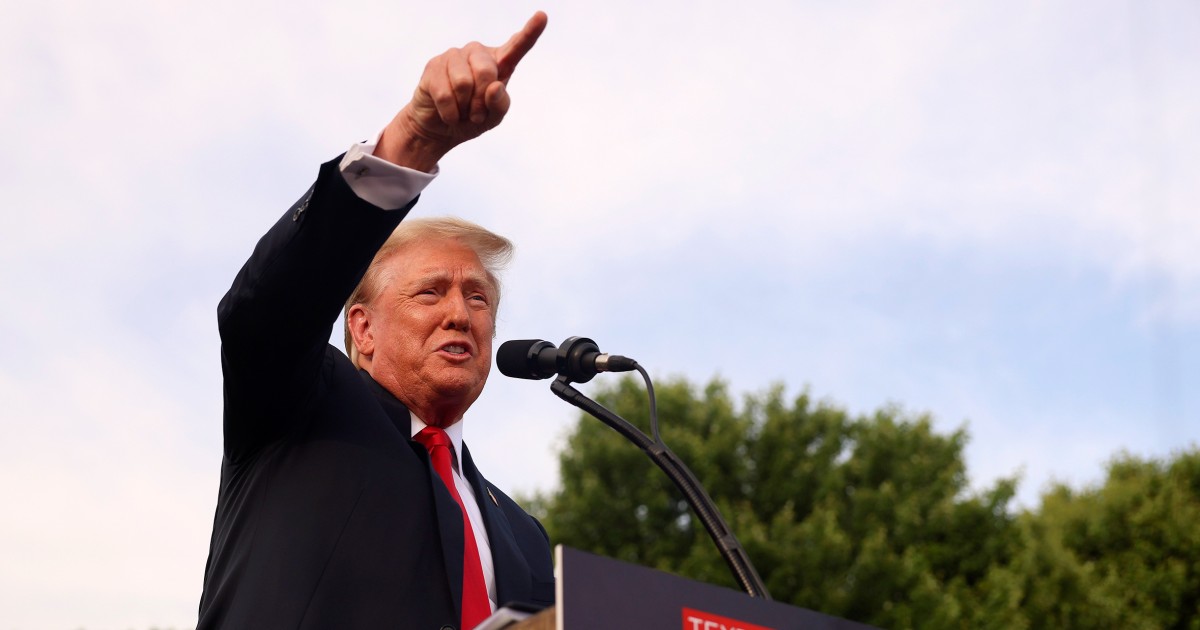Republican presidential candidate Donald Trump, who incited a violent insurrection in January 2021 to try and remain in office illegally after he lost the 2020 election, has been clear about what kind of president he intends to be if he returns to the White House in January 2025.
In December 2023, he declared that he would be a dictator “on Day One” of his time in office. He proposed deploying the National Guard and even the military as a deportation force in an April interview with Time magazine. Add in his recent statement at the National Rifle Association convention that he might need three terms, and a new video from his Truth Social account with multiple references to the “creation of a unified Reich” — the Nazi government was known as the Third Reich — and it seems likely that a Trump victory would usher in a new autocratic era for America.
This surreal situation reflects both an information deficit and a disinformation surfeit.
Yet it seems that so many in America are treating this election as politics as usual. Primaries, caucuses and other events proceed, even as the Republican nominee refuses to commit to accepting lawful election results if he is not the victor. And most of the GOP still embraces the false reality that Trump won the 2020 election as well.
This surreal situation reflects both an information deficit and a disinformation surfeit. A March poll of swing-state voters revealed that most respondents were unaware of Trump’s criminal charges, dictator threats, use of fascist language (such as calling people “vermin”), and vows to pardon the “patriots” who attacked the Capitol on Jan. 6. More worryingly still, the poll excluded voters who believed Biden stole the 2020 election. Those surveyed, though they are not lost in the Trumpist alternate universe, lack the information to take the threats to our democracy seriously.
And many better-informed Americans don’t take Trump’s proclamations and actions seriously either. Instead, they accuse those who are sounding the alarm at his strongman actions and rhetoric of hyperbole and hysteria.
Certainly, Americans are prone to thinking “it can’t happen here.” Our country has lived on its reputation as a bastion of freedom and democracy, and since we have never had a national dictatorship at home (though the Jim Crow South was a regional authoritarianism), many people don’t recognize autocratic creep as it unfolds. But as Robert Kagan’s stirring essay for The Washington Post put it: “A Trump dictatorship is increasingly inevitable. We should stop pretending.”
Yet too many are still pretending. President Joe Biden’s age receives far more coverage than Trump’s declarations that if he returns to the White House he will detain and deport millions of people and allow Vladimir Putin’s Russia to “do whatever the hell they want.” Such is his affinity for Russia’s authoritarian that he’d let Moscow attack NATO member states if they pose obstacles to Putin’s imperialist ambitions — a situation that could trigger World War III.
Dwelling in denial is the default mode for millions who have taken our freedoms for granted.
These dire outcomes can seem unreal, a world away from our daily lives of school pickups, doctor visits, work commitments and sports competitions. Dwelling in denial is the default mode for millions who have taken our freedoms for granted and don’t want to think about how their lives would be altered by the advent of authoritarian governance in America.
Americans are not the first to live in a state of collective denial. Authoritarians have often told us what they are going to do, but people have rarely believed them, or they have felt that since they didn’t fit the profile of those the autocrat was targeting, they wouldn’t be affected. Later, when it came their turn to be harassed or persecuted, it was too late to do much about it.
When Italian Prime Minister Benito Mussolini declared dictatorship in 1925, most active anti-Fascists tried to leave Italy or went into hiding to avoid going to jail. But Ignazio Silone, an Italian Communist who took refuge in a safe house in Milan, heard a comrade say that even as the streets filled with Fascist security forces, people lined up outside the La Scala opera house, waiting to see the latest spectacle as though Mussolini’s seizure of power did not concern them.
In Germany, the Jewish linguist Victor Klemperer, who kept a diary of his life during Hitler’s rule, was not in denial, but had to stay in Nazi Germany since he could not find a university position abroad. “Don’t think about it, live one’s life, bury oneself in the most private matters!” he wrote on Sept. 20, 1938, hoping that each new round of persecution would be the last.
Even when democracy dies by coup, and the repression is heavy and immediate, some underestimate the impact and view the situation as merely temporary. After Chile’s bloody 1973 coup, former Chilean President Eduardo Frei Montalva, a conservative Christian Democrat, was sure that the new military dictatorship would restore order and then “return power to democracy.” But as dictator Augusto Pinochet tightened his grip, Frei realized his grave error and began to criticize the regime. He would die less than a decade later, with his family alleging that Frei was poisoned on Pinochet’s orders.
Tyranny “advances with the pace of a tightening screw rather than with the dash of the executioner’s blade,” wrote the Italian anti-Fascist exile G.A. Borgese in 1937. We can learn from this sad history and treat the actions and declarations of Trump with all the gravity they deserve.

